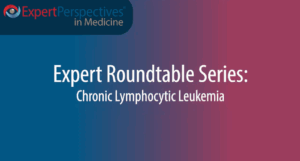Oncology
Chronic Lymphocytic Leukemia
Considering Patient-Specific Goals When Selecting Treatment for Chronic Lymphocytic Leukemia
The consideration of patient-specific goals is critical in the selection of treatment for CLL. First, not everybody needs to be treated. In my clinical practice, patients who are asymptomatic, have a low lymphocyte count or slow doubling time, and who are not having any lymphadenopathies or other symptoms from their CLL can be observed. It is important for patients to recognize that it is not medically indicated to receive treatment just because they have received a diagnosis of CLL.
<br>
When patients do need treatment, what is the best choice? Historically, we used chemoimmunotherapy, but that has been replaced with the small-molecule BTK and BCL-2 inhibitors, which are delivered either continuously or as a fixed-duration therapy, respectively. Many patients with CLL have preferences regarding whether they want to take a drug for essentially as long as it keeps working vs for a short period.
<br>
This then also requires the consideration of whether patients should be treated only with oral agents or whether an intravenous agent, such as an anti-CD20 monoclonal antibody, should be added. Many patients have strong feelings about this, and I would have to say that the literature does not really seem to differ in overall survival, although there are differences in efficacy in terms of progression-free survival (PFS) and molecular remission. It is important to recognize that there are many ways of treating a patient with CLL, and often you will end up with essentially the same outcome in terms of overall survival.
<br>
Patients with CLL also consider adverse events and whether those may lead to the discontinuation of therapy. Cost is another very important consideration. Patients may need to bear insurance copayments or out-of-pocket expenses. These new treatments are quite expensive, especially if you are considering using combinations of drugs.
<br>
Recent studies provide some context for patient-specific goals when selecting treatment for CLL. There was an interesting report of Australian patient surveys by Fifer et al that looked at what individuals with CLL want out of treatment. The number one thing was effectiveness. This was generally defined in terms of improved PFS. Patients also wanted a decrease in symptoms and out-of-pocket expenses. Moreover, in general, there was a preference for oral therapy vs intravenous therapy, and duration of treatment also came into play.
<br>
A discrete choice experiment of 220 patients with CLL and 151 oncologists by Le and colleagues found that increasing 2-year PFS from 75% to 95% was valued the most by both patients and oncologists, but patients valued it more than oncologists. It took a greater potential improvement in PFS to compensate for the increased risks of atrial fibrillation and other factors among oncologists compared with patients. It is interesting that patients and oncologists seemed to be slightly disconnected here. Oncologists seemed more concerned with risks such as atrial fibrillation and infection, as well as with whether the patient can stay on the drug for very long. Patients were really more concerned with increases in PFS.
Eyre TA, Hori S, Munir T. Treatment strategies for a rapidly evolving landscape in chronic lymphocytic leukemia management. Hematol Oncol. 2022;40(2):129-159. doi:10.1002/hon.2943
<br>
Fifer S, Godsell J, Opat S, et al. Understanding the experience, treatment preferences and goals of people living with chronic lymphocytic leukemia (CLL) in Australia. BMC Cancer. 2024;24(1):831. doi:10.1186/s12885-024-12589-9
<br>
Le H, Ryan K, Wahlstrom SK, et al. Oncologist and patient preferences for novel agents in first-line treatment for chronic lymphocytic leukemia: commonalities and disconnects. Patient Prefer Adherence. 2021;15:99-110. doi:10.2147/PPA.S289139
<br>
Nguyen TT, Nhu NT, Tran VK, et al. Efficacy and safety of add-on anti-CD20 monoclonal antibody to Bruton tyrosine kinase inhibitor treatment for chronic lymphocytic leukemia: a meta-analysis. Sci Rep. 2023;13(1):9775. doi:10.1038/s41598-023-36279-x











